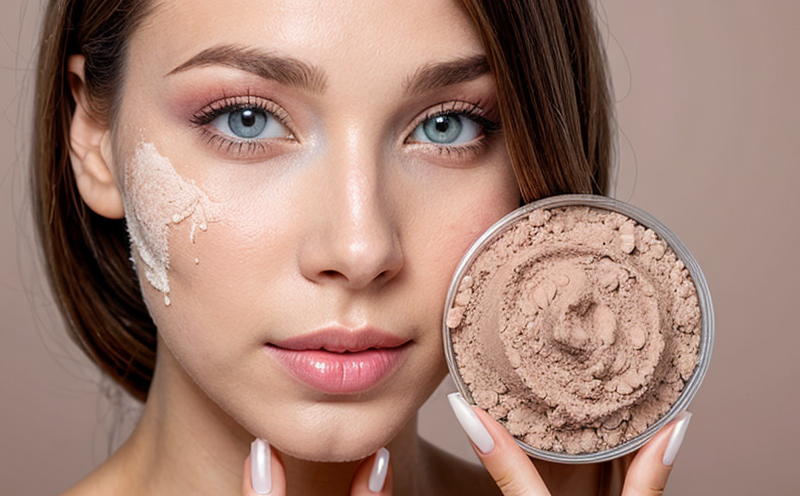Skin Sensitization Testing for Cosmetic Ingredients
The testing of cosmetic ingredients to determine their potential to cause skin sensitization is a critical aspect of product safety and regulatory compliance. Skin sensitization refers to the induction of an allergic response in the skin, which can lead to adverse effects such as rashes or other dermatological conditions upon repeated exposure.
For beauty products, ensuring that ingredients do not trigger such sensitizations is paramount. This testing process involves various stages, including initial screening tests and definitive animal-based models like the Local Lymph Node Assay (LLNA) and the Guinea Pig Maximization Test (GPMT). These tests are designed to identify substances likely to cause allergic contact dermatitis.
The LLNA is a widely recognized in vitro assay that measures the proliferative response of lymphocytes from the draining lymph nodes. The test uses three doses of the test substance, one being the highest concentration used on human skin during regular use. By comparing the proliferation rate of lymphocytes exposed to the test substance versus control samples, the likelihood of sensitization can be determined.
The GPMT is another in vivo method that evaluates whether a compound induces an allergic response by measuring weight gain or loss at the site of application after repeated dosing. This assay provides insights into the potential for contact dermatitis and is particularly useful when the LLNA results are inconclusive.
Both methods require strict adherence to international standards such as ISO 10993-11:2018 and OECD Guidelines for Testing of Chemicals, specifically OECD TG 429 for LLNA. These guidelines ensure consistency and reliability in testing protocols across different laboratories.
The importance of these tests cannot be overstated, especially given the increasing emphasis on reducing animal use in scientific research. Regulatory bodies worldwide are encouraging the development and adoption of alternative methods to minimize reliance on animals.
Understanding the potential for skin sensitization is crucial not only from a safety perspective but also from a business standpoint. A product that causes severe allergic reactions can lead to negative publicity, legal issues, and loss of market share. Therefore, thorough testing ensures that products meet stringent regulatory requirements while maintaining consumer trust.
In conclusion, the process of skin sensitization testing for cosmetic ingredients is complex yet essential. It involves rigorous scientific methods aimed at safeguarding public health while upholding high standards of product quality. As technology advances, there is a growing trend towards more humane and efficient testing procedures that balance ethical considerations with regulatory compliance.
Scope and Methodology
| Test Method | Description |
|---|---|
| Local Lymph Node Assay (LLNA) | This in vitro test measures the proliferative response of lymphocytes from the draining lymph nodes to assess potential skin sensitization. |
| Guinea Pig Maximization Test (GPMT) | An in vivo method that evaluates weight gain or loss at the site of application after repeated dosing, providing insights into contact dermatitis risks. |
The scope of skin sensitization testing encompasses a range of cosmetic ingredients including fragrances, preservatives, and colorants. Each ingredient undergoes detailed evaluation to ensure it meets stringent safety standards. The methodology adheres strictly to international guidelines ensuring accurate and reliable results.
During the testing process, careful specimen preparation is crucial. This includes preparing the test substance in accordance with specified concentrations and applying it according to predefined protocols. Precision in these steps ensures that the results are valid and reproducible.
Customer Impact and Satisfaction
Ensuring the safety of cosmetic ingredients is a top priority for regulatory bodies, manufacturers, and consumers alike. By conducting thorough skin sensitization tests, customers can be assured that their products are safe and free from harmful allergens. This not only enhances consumer trust but also protects brands against potential legal challenges.
Our comprehensive testing services provide peace of mind to quality managers and compliance officers by offering clear evidence of product safety. R&D engineers benefit from this service as it enables them to innovate without compromising on safety standards. Additionally, procurement teams can rely on these tests to source high-quality ingredients that comply with international regulations.
Customer satisfaction is our top priority, and we strive to deliver accurate and timely results to meet the demands of our clients. By adhering strictly to international standards, we ensure consistent quality across all our services. Regular feedback from our customers helps us continuously improve our testing processes, ultimately enhancing customer satisfaction and trust.
Competitive Advantage and Market Impact
In the highly competitive beauty industry, maintaining a strong reputation for product safety is vital. Our skin sensitization testing services provide a significant competitive advantage by ensuring that our clients' products meet or exceed regulatory requirements. This not only sets them apart from competitors but also fosters brand loyalty among consumers.
By offering state-of-the-art facilities and experienced personnel, we ensure that our clients receive the most accurate and reliable test results. Our commitment to innovation allows us to stay ahead of changing regulations and consumer expectations. This proactive approach helps our clients maintain a strong market position and adapt swiftly to emerging trends.
The impact on the market is profound as it contributes to the overall improvement in product safety and quality. Consumers are increasingly aware of the importance of safe cosmetics, and companies that prioritize these aspects are likely to gain a competitive edge. Our services play a crucial role in driving this positive shift, contributing to a safer beauty industry for everyone.





